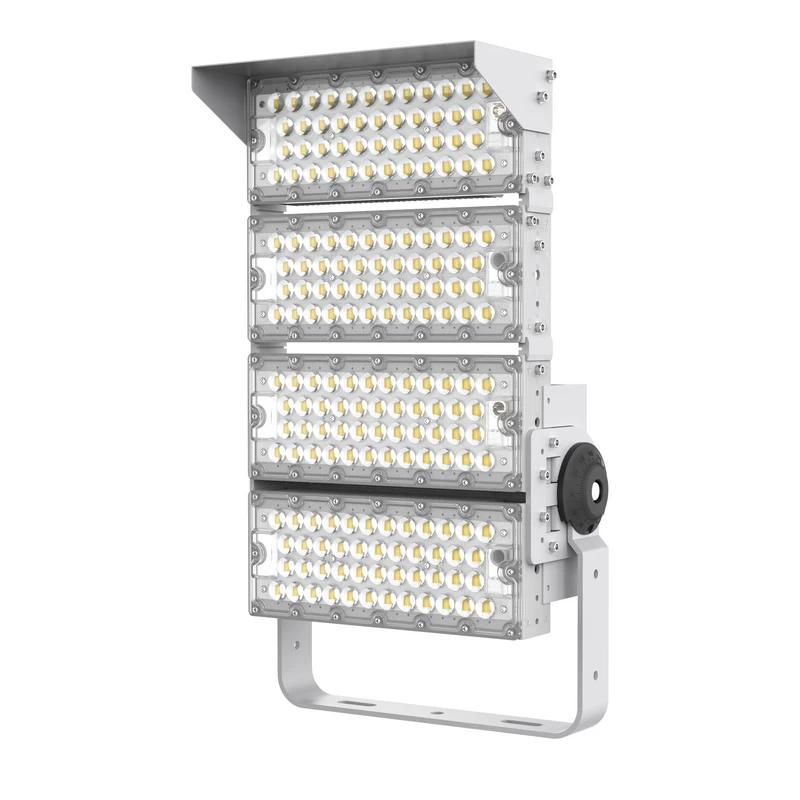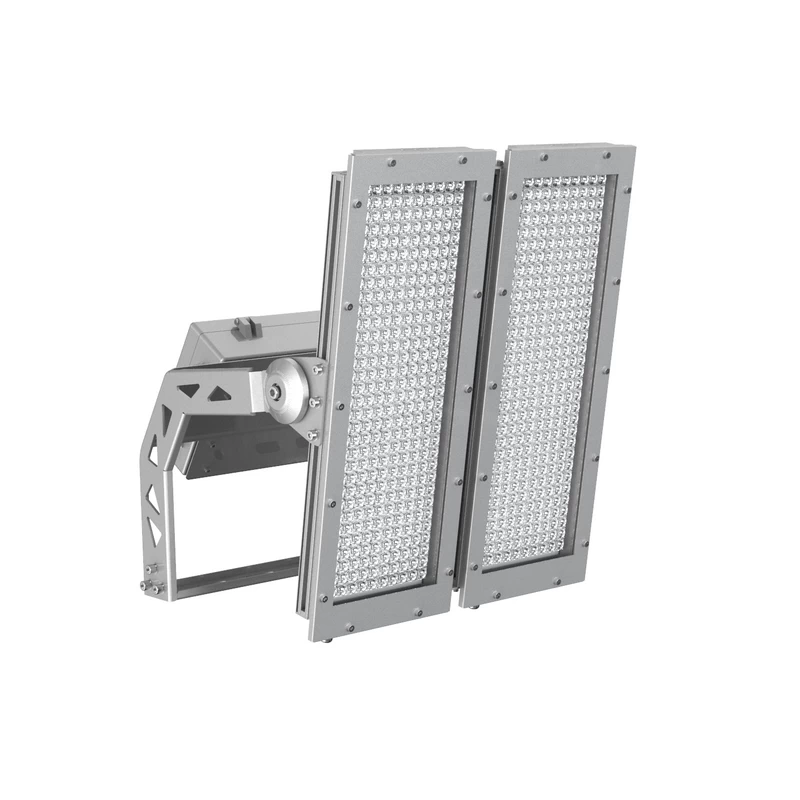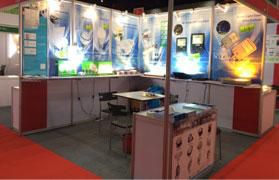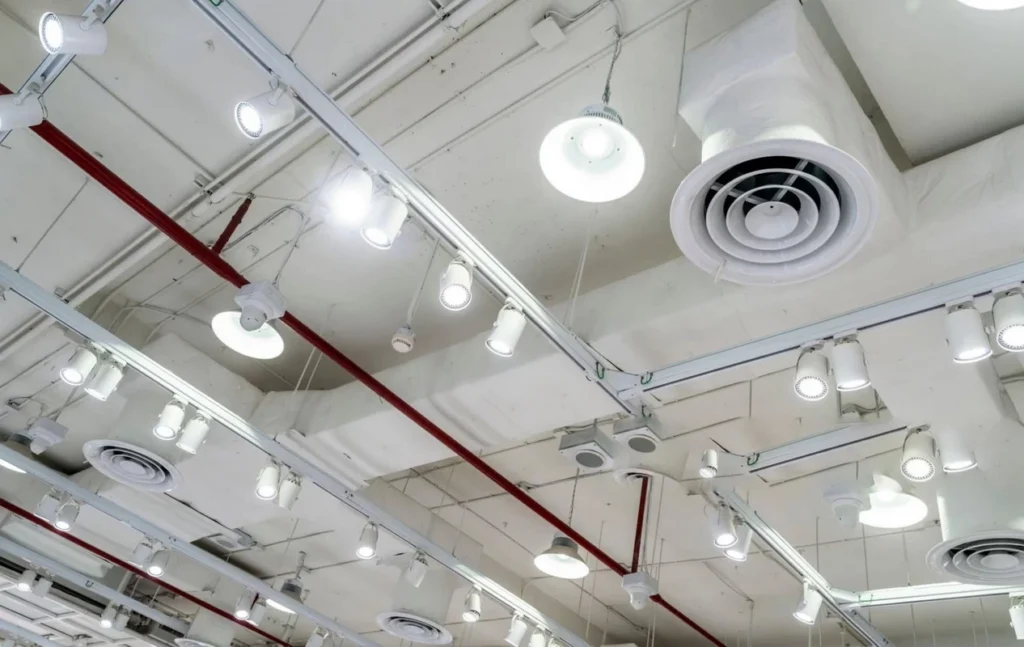Table of Contents
ToggleWhat are flood lights: Definition
Floodlight definition is a light that provides wide-area and uniform lighting. Its core feature is use of a wide-angle beam (beam angle > 60°) and diffusion of light over a large area through diffuse reflection or special lens design. It is suitable for applications requiring large-area illumination, such as plazas, building facades, and stadiums.
Floodlights are an essential component of modern lighting systems, providing uniform, high-intensity illumination across large areas. Unlike spotlights, which focus light on a narrow area, floodlights emit a broad, diffused beam that evenly covers a wide area. This characteristic makes flood lights ideal for various applications, from residential and commercial use to industrial and architectural purposes.

| Flood Lights Feature | Description |
|---|---|
| Wide Beam Angle | Covers large areas with uniform light distribution |
| High Brightness | Delivers powerful illumination for outdoor and large spaces |
| Durable Housing | Made with weather-resistant materials such as die-cast aluminum |
| Adjustable Mounting | Flexible brackets allow easy adjustment of lighting direction |
| Protection Level | IP65 or higher for resistance against water and dust |
Types of Floodlights
- LED Floodlights
LED floodlights are among the most popular choices due to their energy efficiency, durability, and long lifespan. LED flood lights outdoor are widely used in commercial, residential, and industrial settings. They provide bright, consistent illumination while consuming significantly less energy than traditional lighting options.View our range of commercial and industrial LED floodlights. - Fluorescent Floodlights
Fluorescent floodlights are another common type, known for their high light output and relatively low energy consumption. These are often used in industrial and commercial settings where bright, broad illumination is necessary. However, they are less energy-efficient compared to LED floodlights. - Halogen Floodlights
Halogen floodlights provide a very bright, white light, making them ideal for outdoor applications such as backyard flood lights. While they offer excellent color rendering, halogen lights are less energy-efficient and have a shorter lifespan compared to LED flood lights.
| Feature | LED Floodlight | Fluorescent Floodlight | Halogen Floodlight |
|---|---|---|---|
| Energy Efficiency | Very high, consumes up to 80% less energy than halogen | Moderate, more efficient than halogen but less than LED | Low, high energy consumption |
| Lifespan | Up to 50,000 hours | 8,000–15,000 hours | 2,000–4,000 hours |
| Light Quality | Bright, available in various color temperatures, minimal flicker | Softer light, possible flicker, limited color options | Warm light, high color rendering, instant on |
| Heat Emission | Very low heat output | Low to moderate heat output | High heat output |
| Durability | Shock and vibration resistant | Moderate durability, more fragile tubes | Less durable, filament sensitive to shocks |
| Maintenance | Minimal maintenance required | Occasional tube replacement | Frequent bulb replacement |
| Cost | Higher upfront, lower long-term cost | Moderate cost | Low upfront, high running cost |
Structure of Floodlights: Understanding the Components
Floodlights are designed with several critical components that work together to provide efficient lighting. Understanding these components is essential for selecting the right flood light for your needs.

- Light Body
The lamp body is the main structure of the floodlight, usually made from metal materials like aluminum. This ensures the floodlight is durable, offers excellent heat dissipation, and protects the internal components. - Light Source
The light source is the core of the flood light. LED floodlights use LED chip, which are more energy-efficient and have a longer lifespan. Halogen floodlights and fluorescent floodlights are other options, each with its pros and cons. - Lens
The lens in a flood light helps distribute the light evenly across a broad area. This component is vital for achieving the highly diffused effect characteristic of flood lights. - Reflector
The reflector focuses and directs the light emitted by the source. Made from highly reflective materials, it ensures that the light is efficiently used, minimizing wastage and maximizing brightness.
The Used of Floodlights: Applications and Benefits
Floodlights play an essential role in various applications, providing both functional and aesthetic benefits. Whether used in a commercial setting, an industrial environment, or for residential purposes, flood lights offer versatile solutions.

- Large Area Illumination
One of the primary roles of flood lights is to illuminate large areas. This makes them ideal for outdoor spaces like stadiums, parking lots, and outdoor stages. Commercial LED flood lights and industrial flood lights are particularly effective in these environments, providing bright, even illumination that enhances visibility and safety. - Enhanced Security
Floodlights are crucial for security purposes, often referred to as security flood lights. They deter intruders by illuminating dark areas, making it difficult for unauthorized individuals to approach undetected. LED security flood lights are particularly effective, offering bright light with low energy consumption. - Architectural Enhancement
In addition to their practical uses, flood lights can also enhance the aesthetic appeal of buildings and landscapes. Architectural floodlights are used to highlight the design features of structures, transforming them into visual landmarks at night. - Supporting Outdoor Activities
Floodlights are indispensable for outdoor activities that extend into the evening. Whether for sporting events, concerts, or backyard gatherings, outdoor flood lights ensure that participants and spectators can enjoy their time without the limitations of darkness.
Choosing the Best Floodlight
Selecting the right flood light or flood bulb depends on several factors, including the area to be illuminated, the desired brightness, and the specific requirements of the environment. Therefore, the power, beam angle, color temperature, protection level and installation height of the flood light will be different.You can check the article “How to choose the best floodlight“.

Conclusion
Floodlight is a light with wide illumination range, high brightness, uniform and soft light. It is a widely used lighting solution that can be used in almost all outdoor scenes. Whether you need outdoor LED floodlights for commercial, garden, or industrial use, we have a wide selection.
People Also Ask
Are LED floodlights the mainstream choice now?
Yes. In commercial, industrial, sports stadium, landscape lighting and other fields, LED floodlights have almost completely replaced traditional halogen and fluorescent floodlights. This is because they have many advantages, including more energy saving, long life, good light quality, low maintenance.
What are the characteristics of floodlights?
Floodlights generally have high power and high lumen, which can achieve wide and uniform light coverage and high brightness.
What are the common usage environments for floodlights?
Floodlights are common both indoors and outdoors.
- Outdoor applications include parks, plazas, parking lots, stadiums, billboards, and more.
- Indoor applications include factories, warehouses, logistics centers, and sports fields.








